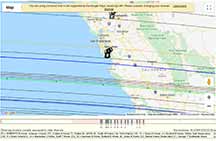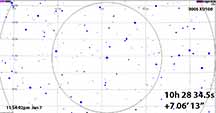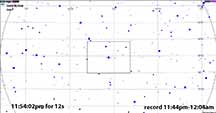


This is a special event by a Trans-Neptunian Object (a Kuiper Belt Object) with orbit similar to that of Pluto. The path is not well determined so the odds of a hit are low for us. Only 5%, but because the star is so bright, and it's a more important event, there are two dozen observers who have signed up on OW. The event lasts 12 seconds and the star is very bright, so we can characterize the shape of the object very well if we get data from our fence of observers. Integration can be set at one field and get great accuracy. The object is a few degrees below Regulus, in Leo. The time uncertainty is 3 minutes (1 sigma) so to have confidence in getting this object and perhaps any moons, we should observe for a good 10 minutes before and after the predicted time, 20 minutes total, if not more. Travel won't improve the odds of a hit.
 |
 |
 |
Kirk Bender
Kirk's reduced his tape.... No occultation. Recording from 7:44:47 to 8:05:18 UT. I find the point-to-point variation unusually high for such a bright star. I am wondering if all the star light was kept inside a suitably large aperture. Maybe experiment with a fixed large circle aperture?
|
PyMovie light curve. No clouds for this event |
Richard Nolthenius
I got a recording from 7:40:45 UT to 8:04:03 UT, and no drops in the light curve. A miss: no KBO and no moons.
Karl von Ahnen
Got a recording from 7:45:26 to 12:04:01 and also - no occultations.